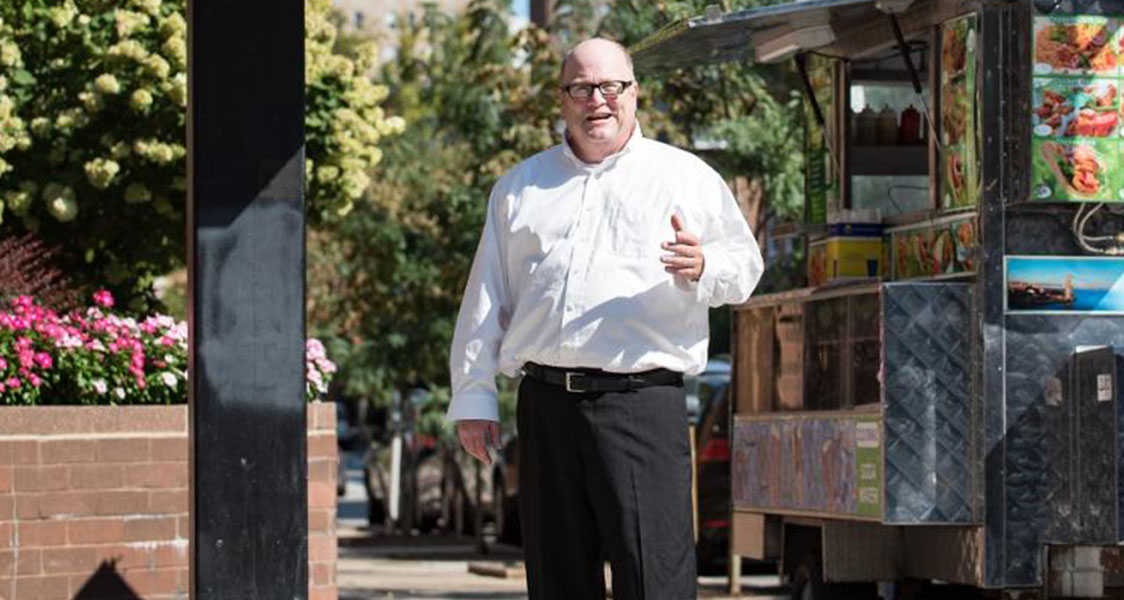When Harry Drake blew out his birthday candles on January 8, 2017 he was looking forward to what life had in store for him in his 53rd year. As a carpentry teacher at a local middle school, Harry was looking forward to finishing second semester projects with his students before preparing to enjoy a relaxing summer vacation. Unknown to him, the first few months of 2017 would prove to be the most challenging he had ever experienced.
“I found myself dealing with a persistent cough, and overall I was feeling lousy,” said Harry.
Harry visited his local urgent care center on January 16, 2017 to hopefully better understand what was causing his illness.
“After being directed to go to the emergency room, it became a struggle to breathe. I remember walking into the emergency room explaining my situation, and then I remember nothing else until weeks later.”
Harry’s health began to deteriorate so rapidly that he became hypoxic shortly after arriving at his regional emergency room, leading him to be placed on a ventilator while in an induced medial coma. Within days of being admitted, a decline in health brought on the onset of steady fevers spiking to 104 degrees, while his medical team struggled to tame the infection wreaking havoc. After a week and a half of care at his local hospital following a minor heart attack and the onset of sepsis, doctors explained to his family that there was very little they could do for his recovery, due to the enormous amount of stress the illness had on his body. His only chance for survival was to be placed on ECMO (Extracorporeal Membrane Oxygenation), an open-heart surgery that uses a machine to take over the work of the lungs and heart, serving as life-support. Or they had the option of choosing to prepare to goodbye.
Knowing the strong reputation Penn Medicine has for being able to care for medically complex cases, Harry’s family requested for him to be transferred to Penn Presbyterian Medical Center (PPMC) in an attempt to save his life. Within an hour, Harry was airlifted via PennSTAR to PPMC, to undergo emergency ECMO surgery.
Under the care of the medical team at the Cardiac Intensive Care Unit (CICU), multiple interventions started to treat the infections in his bloodstream and to improve the diminished lung capacity related to the stress brought on by staph pneumonia. While trying to find the reason behind his hypertensive crisis and Supraventricular tachycardia (SVT) during a cardiac cauterization, doctors discovered Harry had three vessel disease which would require a triple bypass surgery. Because of his ventilator-dependent state and comprised health, the surgery was on standby until Harry’s infections were cleared up and his breathing was independent. To relieve stress from his heart while recovering, doctors inserted an intra-aortic balloon pump (IABP) to help the heart pump blood.
In order to be able to undergo triple bypass surgery, he needed to make massive strides in his physical abilities. Knowing that time was against him, Harry’s family requested acute physical rehabilitation services as soon as he was cleared by his medical team.
It seemed impossible that physical therapy could take place by the bedside of a patient who barely able to move and only recently out of coma, but the acute therapy team at Penn Presbyterian Medical Center specializes in early intervention rehabilitation. Each day, Harry worked with physical therapists and occupational therapists to relearn how to use every muscle in his body — muscles that most take for granted. Over the next two weeks, Harry’s body began to gain more stamina and flexibility.
Eventually liberated from the ventilator, he worked on sitting up in his hospital bed, sitting in a chair, and using a walker to get to the toilet. Acute speech therapists worked with Harry to adjust to being off the ventilator for the first time in almost a month. Through therapy, he was reintroduced to eating solids, learning how to swallow liquids without choking, and speaking clearly again.
After six weeks of hospitalization, Harry underwent a successful triple bypass surgery, allowing him to begin the next phase of his recovery – inpatient rehabilitation at Penn Medicine Rehabilitation. Knowing nothing about physical rehabilitation except for what he experienced in an acute setting, Harry knew that this was the last hurdle for him to return home after three months.
At Penn Medicine Rehabilitation, Harry’s therapy increased to three hours daily, which built on the foundation set by his acute therapy team at PPMC.
Through a combination of acute and inpatient therapy, in addition to the guidance of his medical team at PPMC, Harry returned home in early March after two months of hospitalizations. After continuing his rehabilitation and several weeks of home care therapy, Harry once again regained a part of his life that had seemed unattainable — returning to the classroom in May 2017.
“No one believes I was near death just a few months ago. Getting back into the classroom, it was exciting to see how my students continued to develop while I was ill. While working on their end-of-year projects, I realized that we all did a lot of growing this school year.”
– Harry Drake

